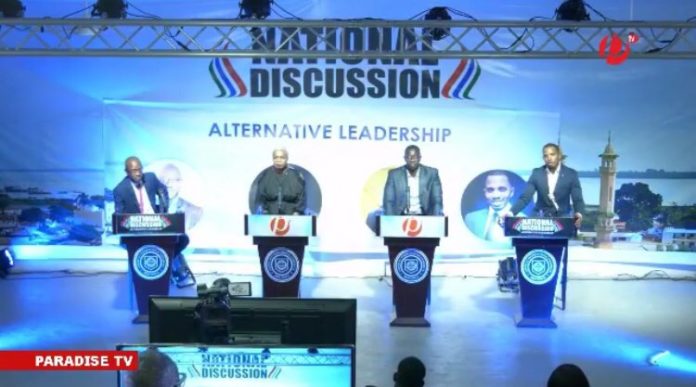By Lamin Njie
Papa Njie said ‘I was not born then’ when Dr Ismaila Ceesay asked him what he would have done differently if he was president between 1965 and 1994 to prevent the 1994 coup, as the duo locked heads in a Paradise TV debate on Saturday alongside GAP’s Lamin Bojang and political newcomer Marie Sock.
In part three of the discussion, the politicians were asked by host Harona Drammeh to ask each other questions.
Dr Ceesay asked Mr Njie what he would have done differently if he were the president from 1965 to 1994 to avoid the 1994 debacle.
Papa Njie in a strange riposte said, amid huge laughter: “Dr, we have to be realistic. I was not born then. So, let’s stop trying to win political points.”
The well-watched debate Saturday evening began with the politicians introducing their ideas and agendas.
“Forty-five percent of the Gambian youth are unemployed. Out of them, 62 percent of those holding diplomas are unemployed, 66 percent of those people who have completed tertiary education are unemployed,” Papa Njie who was handed the privilege of getting the ball rolling began by saying as he first indicated how thrilled he was to be part of the debate.
He added: “That is our problem. We have to make sure that we create the jobs, we create the policies for those young people.”
Marie Sock said the state of The Gambia in terms of development was one of the reasons she decided to be in politics.
“…Coming back home and realising that Gambia is actually going backwards instead of forwards. I’ve worked through the charity organisation that I have with a lot of youths, with a lot of people, the local level to all levels and I have seen their plight,” she said.
She continued: “When we talk about development, we have to look at where Gambia was 50 years ago to now. It’s just slowly deteriorating.
“But then when you hear how much money is coming into our country since the first republic till now, you need to start questioning yourself of what has really been done.
“You look at our education system, it’s a disgrace. There is no way to sugarcoat it. And this is one of the reasons I work with youths, I do charity, I go to schools, I see their plight.”
GAP flagbearer Lamin Bojang insisted Gambia Action Party is a party with a ‘philosophy’.
“Our approach is all inclusive,” he said.
The retired general then added: “What we see is Gambia and Gambian people. We believe that for us to be able to do anything in this country, we have to first and foremost find out what are the problems in this country.
“And one thing that is standing clearly is that we knew very well that there is a leadership vacuum in The Gambia. And as a result, we want to substitute that leadership vacuum with a leader that can live up to task, a leader whose leadership skills have been tested, a leader who is sympathetic, a leader who knows The Gambia, a leader who is a Gambian but a leader who has the will to develop this country.”
Dr Ismaila Ceesay of Citizens’ Alliance said since independence, “we’re not able to cure ourselves as a nation”.
Dr Ceesay said: “Today, in the 21st century, you will hear news that somebody needs blood and they’re looking for someone to donate blood at the hospital. If you’re sick and you’re not sent to Senegal for treatment, then you might as well die in one of our hospitals.
“Since independence, we’re not even able to secure ourselves. The last time I checked, we still have ECOMIG forces in this country, the last time I checked our president is still guarded by Senegalese forces. Therefore, since independence, we’ve not been even able to secure our territory.
“Since independence, our energy needs have not been met by ourselves. Even where it exists, it is expensive. Even where you electricity, it is either erratic or expensive.
“Therefore something has gone wrong. But on a more sobre note, let’s look at the seeds of time, and try to predict the future. Our demographic realities are dire. It is projected that in 2050, we will be five million people, over 65 percent will be young people. Currently, the median age of this country is 17, so a very young population. Do we have the infrastructure for five million people in 30 years time? Do we have the schools? Do we have the hospitals? Do we have the roads? Do we have jobs for those young people who will be here in 2050?”




